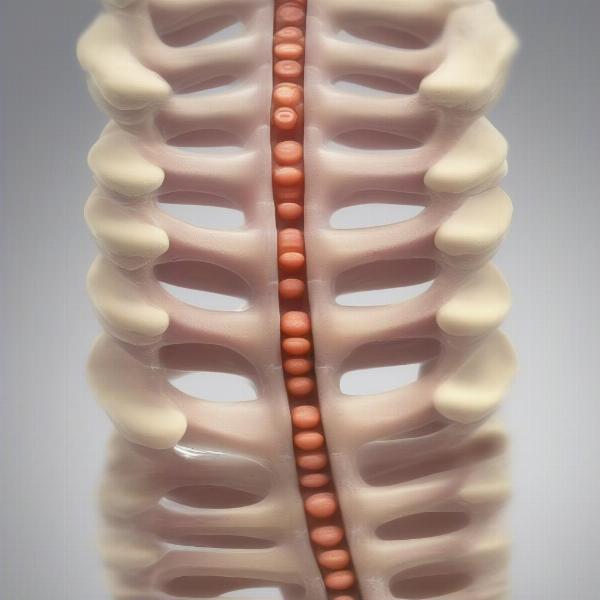The dachshund, affectionately known as the “sausage dog,” has a unique and fascinating skeletal structure that contributes to its distinctive long body and short legs. Understanding the sausage dog skeleton is crucial for owners, as it can help them understand their dog’s predispositions to certain health issues and how best to care for them. This article will delve into the intricacies of the dachshund’s skeletal anatomy, explaining its key features, potential problems, and how these relate to overall health and well-being.
The Elongated Spine: A Hallmark of the Dachshund
The most defining characteristic of the sausage dog skeleton is its elongated spine. Dachshunds have the same number of vertebrae as other dog breeds, but their vertebrae are longer, giving them their characteristic long back. This elongated spine, while contributing to their adorable appearance, also makes them susceptible to intervertebral disc disease (IVDD). IVDD occurs when the cushioning discs between the vertebrae degenerate or herniate, putting pressure on the spinal cord and causing pain, weakness, and even paralysis.
This inherent vulnerability necessitates careful handling and management, avoiding activities that put excessive strain on their backs, such as jumping from heights or rough play.
 Dachshund Spine and Intervertebral Discs
Dachshund Spine and Intervertebral Discs
Short Legs, Big Impact: The Dachshund’s Limb Structure
The dachshund’s short legs, known as chondrodystrophy, are another distinctive skeletal feature. This genetic trait results in shortened long bones in the legs, giving them their low-slung stature. While charming, this characteristic can also lead to various orthopedic problems, including patellar luxation (slipping kneecaps) and elbow dysplasia.
Understanding the dachshund’s skeletal predisposition to these conditions is crucial for responsible ownership. Maintaining a healthy weight, providing appropriate exercise, and avoiding activities that strain their joints can help mitigate these risks.
Protecting Your Dachshund’s Skeletal Health
Knowing the specifics of the sausage dog skeleton allows owners to proactively safeguard their dog’s well-being. Simple measures, like supporting their back when lifting, providing ramps for furniture access, and ensuring they maintain a healthy weight, can greatly reduce the risk of skeletal problems. Regular veterinary checkups are also essential for early detection of any potential issues.
Conclusion
The sausage dog skeleton, with its unique elongated spine and short legs, contributes to the breed’s distinctive charm but also presents specific health challenges. By understanding the intricacies of their skeletal structure, owners can take proactive steps to protect their dachshund’s health and ensure a long, happy life. Responsible ownership includes careful handling, appropriate exercise, a healthy diet, and regular veterinary care.
FAQ
- What is the most common skeletal problem in dachshunds? Intervertebral Disc Disease (IVDD) is the most prevalent skeletal issue in dachshunds.
- How can I prevent IVDD in my dachshund? Avoid activities that strain their backs, maintain a healthy weight, and provide proper support when lifting.
- What are other skeletal issues dachshunds are prone to? Patellar luxation and elbow dysplasia are also common in dachshunds.
- How should I lift my dachshund to avoid injuring its back? Support both the chest and hindquarters simultaneously when lifting.
- How often should I take my dachshund for veterinary checkups? Annual checkups are recommended, and more frequently if any issues arise.
- Is special bedding recommended for dachshunds due to their back problems? Orthopedic beds can provide extra support and comfort, particularly for older dogs.
- Can exercise help prevent skeletal problems in dachshunds? Yes, moderate and low-impact exercise is beneficial, but avoid strenuous activities and jumping.
About ILM Dog
ILM Dog is your trusted global resource for all things dog-related. We provide expert advice on breed selection, health and medical care, training, nutrition, grooming, exercise, and much more. Whether you’re a new dog owner or a seasoned expert, ILM Dog offers practical and reliable information to help you navigate every aspect of dog ownership. Contact us for personalized advice: [email protected] | Phone: +44 20-3965-8624. Visit ILM Dog today for more information.